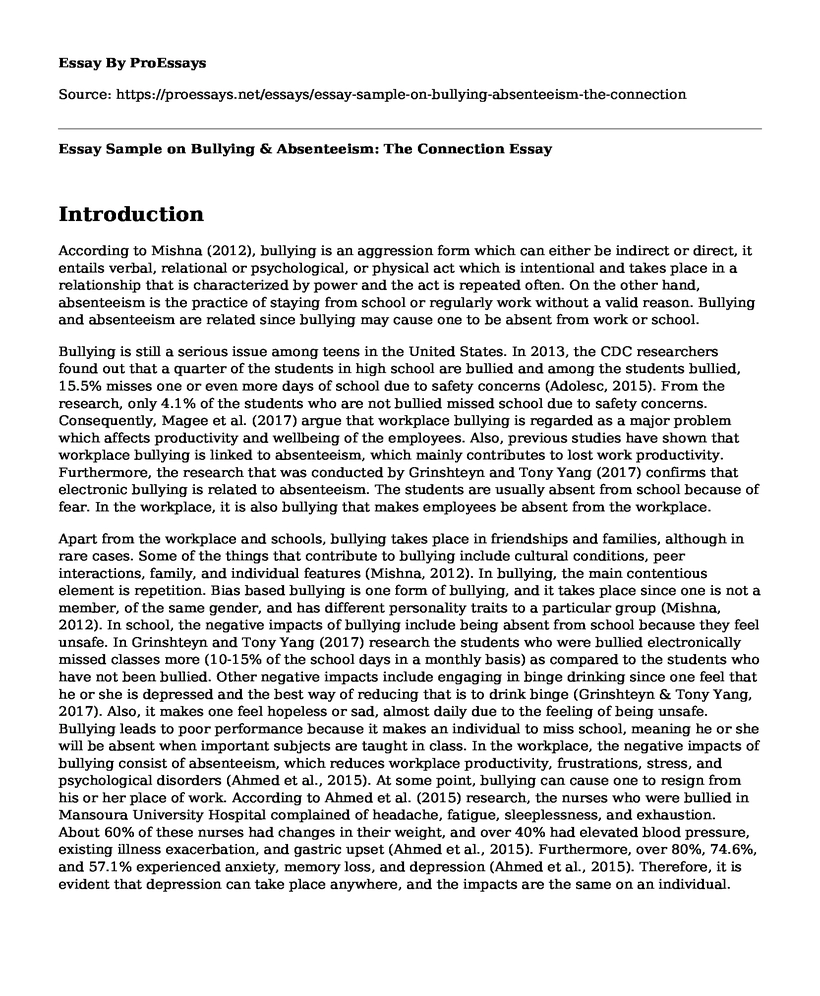Introduction
According to Mishna (2012), bullying is an aggression form which can either be indirect or direct, it entails verbal, relational or psychological, or physical act which is intentional and takes place in a relationship that is characterized by power and the act is repeated often. On the other hand, absenteeism is the practice of staying from school or regularly work without a valid reason. Bullying and absenteeism are related since bullying may cause one to be absent from work or school.
Bullying is still a serious issue among teens in the United States. In 2013, the CDC researchers found out that a quarter of the students in high school are bullied and among the students bullied, 15.5% misses one or even more days of school due to safety concerns (Adolesc, 2015). From the research, only 4.1% of the students who are not bullied missed school due to safety concerns. Consequently, Magee et al. (2017) argue that workplace bullying is regarded as a major problem which affects productivity and wellbeing of the employees. Also, previous studies have shown that workplace bullying is linked to absenteeism, which mainly contributes to lost work productivity. Furthermore, the research that was conducted by Grinshteyn and Tony Yang (2017) confirms that electronic bullying is related to absenteeism. The students are usually absent from school because of fear. In the workplace, it is also bullying that makes employees be absent from the workplace.
Apart from the workplace and schools, bullying takes place in friendships and families, although in rare cases. Some of the things that contribute to bullying include cultural conditions, peer interactions, family, and individual features (Mishna, 2012). In bullying, the main contentious element is repetition. Bias based bullying is one form of bullying, and it takes place since one is not a member, of the same gender, and has different personality traits to a particular group (Mishna, 2012). In school, the negative impacts of bullying include being absent from school because they feel unsafe. In Grinshteyn and Tony Yang (2017) research the students who were bullied electronically missed classes more (10-15% of the school days in a monthly basis) as compared to the students who have not been bullied. Other negative impacts include engaging in binge drinking since one feel that he or she is depressed and the best way of reducing that is to drink binge (Grinshteyn & Tony Yang, 2017). Also, it makes one feel hopeless or sad, almost daily due to the feeling of being unsafe. Bullying leads to poor performance because it makes an individual to miss school, meaning he or she will be absent when important subjects are taught in class. In the workplace, the negative impacts of bullying consist of absenteeism, which reduces workplace productivity, frustrations, stress, and psychological disorders (Ahmed et al., 2015). At some point, bullying can cause one to resign from his or her place of work. According to Ahmed et al. (2015) research, the nurses who were bullied in Mansoura University Hospital complained of headache, fatigue, sleeplessness, and exhaustion. About 60% of these nurses had changes in their weight, and over 40% had elevated blood pressure, existing illness exacerbation, and gastric upset (Ahmed et al., 2015). Furthermore, over 80%, 74.6%, and 57.1% experienced anxiety, memory loss, and depression (Ahmed et al., 2015). Therefore, it is evident that depression can take place anywhere, and the impacts are the same on an individual.
References
Adolesc, J. (2015). Bullying and Absenteeism. J Adolesc, 43, 1-4. http://www.udelas.ac.pa/site/assets/files/4306/bullying.pdf
Ahmed, A. H., El-shaer, A. H. L. A. M., & Fekry, N. E. H. A. D. (2015). Workplace Bullying and Absenteeism Rate among Staff Nurses at Mansoura University Hospital. Med. J. Cairo Univ, 83(2), 47-54. https://pdfs.semanticscholar.org/04fa/3af472e6f7f4c681bce8afff6225b1fcf834.pdf
Grinshteyn, E., & Tony Yang, Y. (2017). The association between electronic bullying and school absenteeism among high school students in the United States. Journal of school health, 87(2), 142-149. Doi: 10.1111/josh.12476
Magee, C., Gordon, R., Robinson, L., Caputi, P., & Oades, L. (2017). Workplace bullying and absenteeism: The mediating roles of poor health and work engagement. Human Resource Management Journal, 27(3), 319-334. Doi: 10.1111/1748-8583.12156
Mishna, F. (2012). Bullying: A guide to research, intervention, and prevention. New York: Oxford University Press.
Cite this page
Essay Sample on Bullying & Absenteeism: The Connection. (2023, Jan 20). Retrieved from https://proessays.net/essays/essay-sample-on-bullying-absenteeism-the-connection
If you are the original author of this essay and no longer wish to have it published on the ProEssays website, please click below to request its removal:
- A Literary Essay Example: Irony in Counterparts by James Joyce
- How the Private Sector Can Help Tackle the Refugee Crisis Essay
- Women's Caretaker Role in US History: A Zinn Perspective - Essay Sample
- Essay Example on Sexual Harassment: Human Resources' Critical Role
- Sexual Harassment at Work: 8/10 Women Affected - Essay Sample
- Drug Abuse: Its Impacts on Male Reproductive System - Essay Sample
- Paper Example on Addressing Homelessness A Social Imperative







